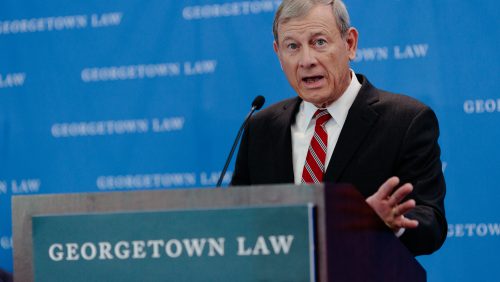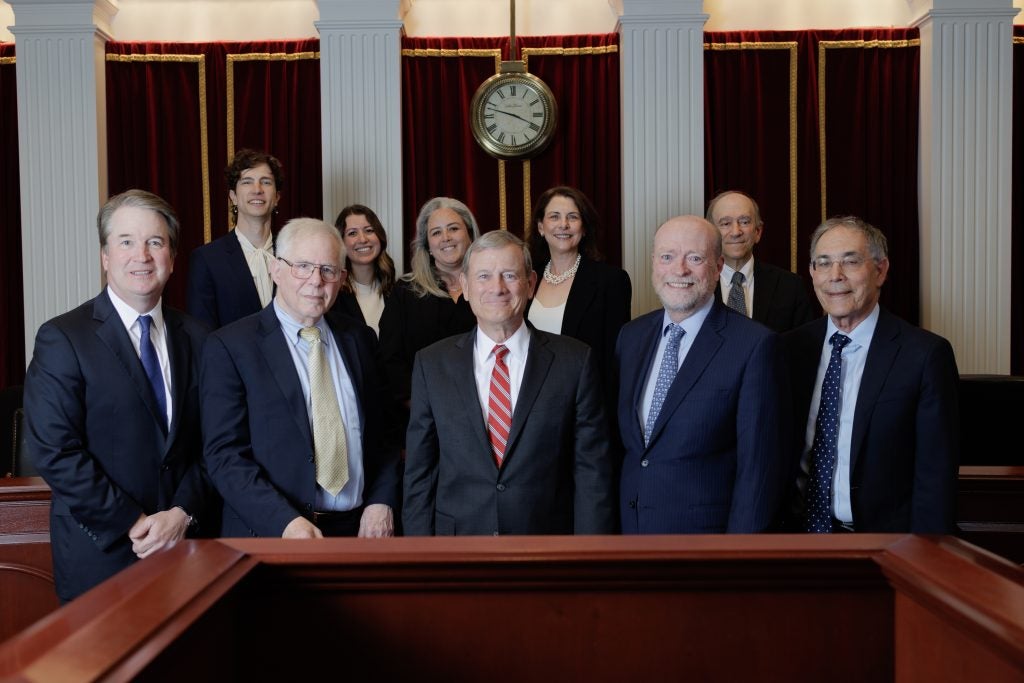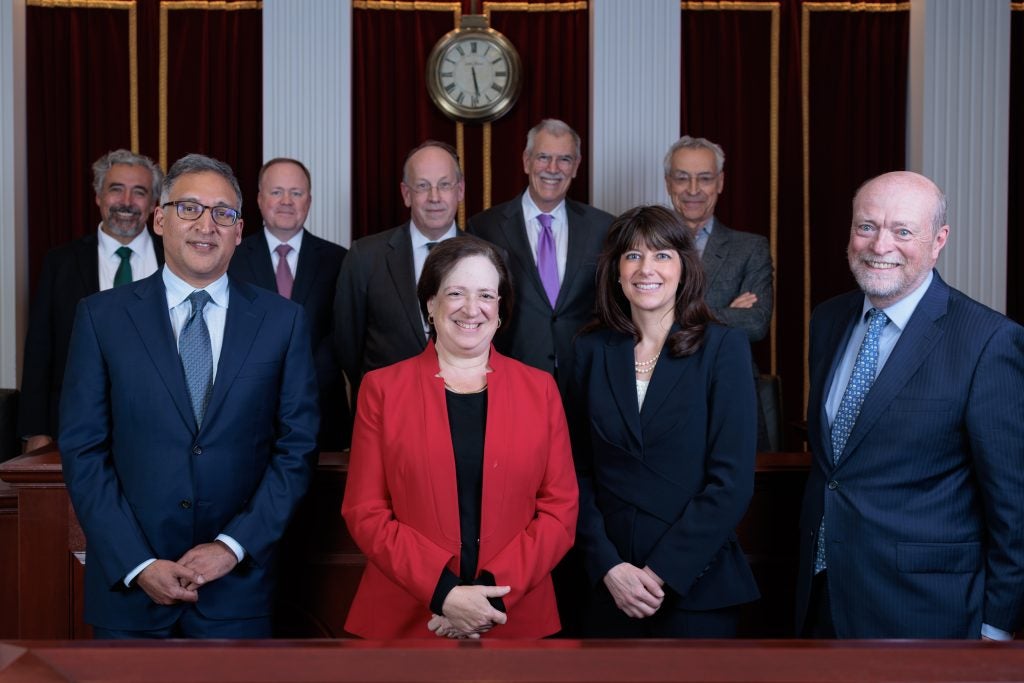Georgetown Law’s Supreme Court Institute Celebrates 25 Years
April 30, 2024

Chief Justice of the United States John G. Roberts, Jr. shared memories at the Georgetown Law Supreme Court Institute’s 25th Anniversary celebration.
It began as a pie-in-the-sky idea from a faculty member, and a quarter-century later has become an invaluable resource for lawyers preparing for oral argument before the U.S. Supreme Court – and a precious educational opportunity for Georgetown Law students.
On April 24, Georgetown Law marked the 25th anniversary of its Supreme Court Institute (SCI), a unique organization that holds moot courts – opportunities for advocates who’ll soon appear at the Supreme Court to pressure-test their arguments before a panel of law professors and experienced Supreme Court Bar members – in advance of nearly every case on the Court’s docket. Three Supreme Court justices, Chief Justice of the United States John G. Roberts, Jr., Associate Justice Elena Kagan and Associate Justice Brett M. Kavanaugh; the current Solicitor General, Elizabeth Prelogar, along with seven of her predecessors; and most of the past and present leadership of the SCI were there to celebrate.
In his remarks, the Chief Justice congratulated the Law Center on the milestone and reminisced about his own experiences with the SCI. Not only was he one of the first advocates to moot an argument with the Institute – in 1999’s Rice v. Cayetano – he also served as a guest Justice many times before becoming a real one. “I have been with you from the start. You had me at hello,” the Chief Justice said.
He reflected as well on the important role advocates play in our legal system. “Subjecting an issue to the crucible of fair and hard-fought argument can be the best and fairest way to get to the correct result, but only if there has been careful preparation on both sides. For a quarter of a century, the Institute has brought together the very best of the Appellate Bar to prepare lawyers for appearances before our court,” said the Chief Justice. “This has been a gift not only to the lawyers but also to the justices, for which we are grateful.”
This video on the founding and evolution of the Supreme Court Institute was shown at the 25th anniversary celebration:
In a video commemorating the anniversary, Harvard Law Professor Richard Lazarus recalled how he proposed his idea for the SCI when he was on the Georgetown Law faculty and was assigned to serve on a long-range planning committee. His ambitious idea to form an institute that could host Supreme Court moots came true thanks to an “only-at-Georgetown” combination of factors that include a faculty well stocked with appellate advocates, Constitutional law experts and former Supreme Court clerks; physical proximity to the Supreme Court; and support from leadership, including Dean Emerita Judith Areen, who green-lit the concept in 1998, and current Dean William M. Treanor, who spoke proudly of the educational opportunities the SCI provides law students.
“Students… gain a close-up view of the most pressing issues in law today, witnessing firsthand what it takes to prepare for argument before the justices – and that’s experience they can get nowhere else,” said Treanor.

Current and former leaders of the Supreme Court Institute with Chief Justice Roberts and Justice Kavanaugh in the SCI’s Moot Courtroom, modeled after the real Supreme Court. Front, L-R: Justice Kavanaugh, SCI Faculty Director Professor Steven Goldblatt, L’70, Chief Justice Roberts, Dean Treanor, SCI Executive Director Professor Irv Gornstein. Back, L-R: Former SCI Assistant Director Kal Golde, current SCI Assistant Director Maddie Sloat, L’27, former SCI Assistant Director Sarah Naiman, L’21, current SCI Director Debbie Shrager, SCI founder Richard Lazarus.
Indeed, the audience of law professors, Supreme Court Bar members and legal journalists also included some eighty current law students who are in classes, seminars and clinics that have worked SCI moots in their curricula. (Additional students took a break from studying in the John Wolff International and Comparative Law Reading Room to peer down through a glass wall into the atrium where the event was taking place.) Whether or not assigned to by their professors, all Georgetown Law students are welcome to attend any SCI moot court, as long as they have no ties to the lawyers or entities in the case being argued.
As Professor from Practice and current SCI Executive Director Irv Gornstein – who has by far the most SCI moots under his belt, having taken part in 332 as of last month – put it in the anniversary video, “When you can get the best advocates in our day talking to students about what they were thinking about, I don’t know how you could get a better education than that.”
Former Solicitor General and current Distinguished Lecturer and SCI Senior Fellow Paul Clement marveled at the generosity of Supreme Court Bar members who volunteer to serve on SCI panels for colleagues and potential adversaries alike. “It is all done in the service of ensuring that the Supreme Court gets the best possible adversarial presentation of the issues. That is all in the best traditions of the bar, but I dare say it seems a bit more counter-cultural in 2024 than it did when this project started in 1999 – and that makes the Institute and the Supreme Court bar well worth celebrating,” he said.
Longtime SCI Faculty Director Professor Steven Goldblatt, L’70 – the runner-up to Gornstein in SCI moot participation, having himself served on 240 panels – summed up the collective warm feeling in the room among all the past and current SCI staffers, Georgetown Law professors and Supreme Court Bar members who’d played large and small roles in the Institute’s work over the years.
“This is a celebration of all the people who have participated in this, and there’s a certain love that we all have for helping,” said Goldblatt. “When you do the moot and you improve somebody’s argument, it’s a feel-good feeling and you stay with it. It just doesn’t go away.”

Eight current and former Solicitors General were on hand to celebrate the 25th anniversary of the Supreme Court Institute. Front, L-R: Professor Neal Katyal, Associate Justice Elena Kagan, Solicitor General Elizabeth Prelogar, Dean William Treanor. Back, L-R: Noel Francisco, Jeffrey Wall, Distinguished Lecturer Paul D. Clement, Donald B. Verrilli, Jr., Seth Waxman.